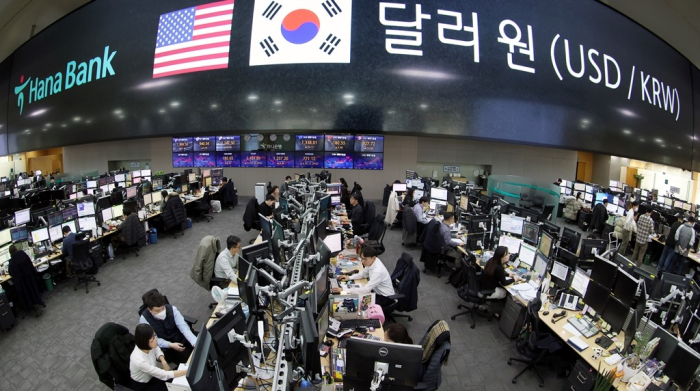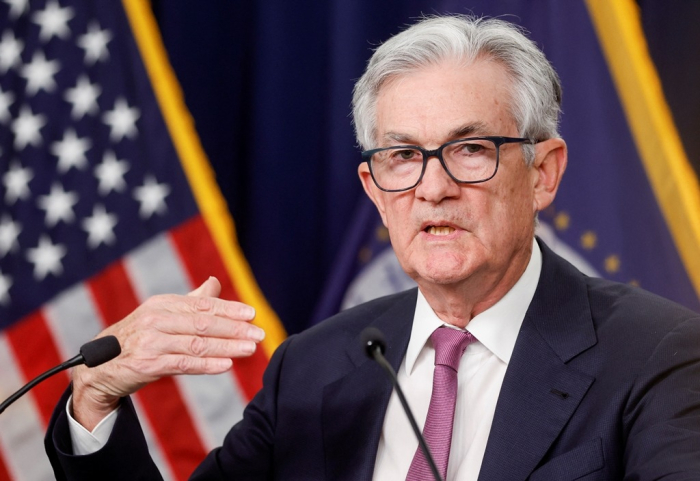Central bank
Korean financial markets tumble as Fed signals higher rates
Ten-year govt bond yield tops psychologically important 4% for first time since Nov; BOK may hike rate despite slowing economy
By Sep 21, 2023 (Gmt+09:00)
5
Min read
Most Read
LG Chem to sell water filter business to Glenwood PE for $692 million


KT&G eyes overseas M&A after rejecting activist fund's offer


Kyobo Life poised to buy Japan’s SBI Group-owned savings bank


StockX in merger talks with Naver’s online reseller Kream


Meritz backs half of ex-manager’s $210 mn hedge fund



South Korean stocks, bonds and its currency tumbled on Thursday as the US Federal Reserve gave indications of another interest rate hike this year and fewer cuts than previously indicated, raising fears of capital outflows from Asia’s fourth-largest economy.
The South Korean government bond yields rallied across the board with the 10-year debt yield up 6.8 basis points (bps) to end at 4.031%, topping the psychologically important 4% level at closing for the first time since Nov. 10, 2022, according to the Korea Financial Investment Association. The highly liquid three-year bond yield and the five-year debt yield also rose 4 bps and 5.7 bps to 3.930% and 3.973%, respectively, their highest closes in 10 months.
Seoul’s main stock market Kospi lost 1.8%, while the junior Kosdaq skidded 2.5% as foreign investors sold a combined net 281.5 billion won ($210.2 million) in the bourses. The South Korean won currency lost up to 0.9% to 1,342.2 per dollar, the weakest in a month, although it recovered some of the losses.
The sell-off came as the Fed on Wednesday suggested the US central bank may take a higher-for-longer approach to interest rates while revising up its economic growth forecasts after leaving the fed funds rate in a target range between 5.25-5.50%, the highest in 22 years.
“We want to see convincing evidence really that we have reached the appropriate level, and we’re seeing progress and we welcome that. But, you know, we need to see more progress before we’ll be willing to reach that conclusion,” said Fed Chair Jerome Powell at a news conference.
Fed officials still see the policy interest rates peaking at 5.6% this year, suggesting that the monetary policy authority will likely increase rates by 25 bps one more time this year. The Fed’s dot plot, however, showed the possibility of two cuts in 2024, two times fewer than indicated in the last update in June.
The policymakers also raised their growth forecast for 2023 to 2.1%, more than double the June estimate and their prediction for next year to 1.5% from 1.1%.
“The Fed expressed confidence in the economy,” said HI Investment & Securities in a note. “That will support the dollar but put more pressure on the won, which will hurt South Korean stocks.”
MAY BOK RAISE INTEREST RATES?
Another US rate hike is expected to widen the differential with the South Korean borrowing cost to a record high of 2.25 percentage points as the country’s policy interest rate stood at 3.50%.
A wider gap is expected to accelerate capital outflows and put further pressure on the won, which has already been battered by a sluggish economy amid the property crisis in China, South Korea’s top overseas market.
Foreign investors already dumped a net $1.7 billion in South Korean stocks and bonds in August, the largest outflows since December last year.
“Rate differentials between South Korea and the US are likely to hurt the won and ramp up interest rates,” said Sung Taeyoon, an economics professor at Yonsei University in Seoul. “Another US rate hike will be a huge blow to South Korea.”

The Bank of Korea is scheduled to hold a monetary policy meeting on Oct. 19.
BOK Governor Rhee Chang-yong has held firm that the central bank needs to leave the door open to raising the base interest rate by 25 bps, although analysts and financial market investors doubted such a tightening, given the slowing economy.
Some economists said the BOK needs to raise interest rates to deal with a weaker won and household debts.
“If the Fed lifts the rates next month, the BOK may have to consider a hike eventually, if not immediately next month,” said Kim Sang Bong, an economics professor at Hansung University in Seoul.
SLUGGISH ECONOMIC GROWTH
Such a tightening is expected to weigh on South Korea’s economy, which has already been under pressure from rising interest rates, a softer won, increasing oil prices and sluggish exports.
Higher borrowing costs amid growing household debts often slash consumption, further slowing down the overall economy.
“Household debts have reached a level that undermines macroeconomic and financial stability,” the BOK said in a report last week.
Private consumption shrank 0.1% in the second quarter from the previous three months when it grew 0.5%.
Climbing oil prices also hurt South Korea, the world’s fifth-largest importer of the resource. Crude oil prices are heading to $100 a barrel amid tighter supply as the global benchmark Brent reached $95 for the first time since November last year.
“Escalating global oil prices ramped up upward pressure on inflation, increasing internal and external uncertainties over the economy,” said the Korea Development Institute (KDI), a government think-tank, in a report on Sept. 9. “The expanding inflationary pressure is likely to limit an economic recovery.”
Consumer prices rose 3.4% in August from a year earlier, the fastest since April, according to government data.
Higher oil prices are also expected to jack up a trade deficit. The country already reported a shortfall of $489 million in the first 20 days of the month.
Such gloomy factors are expected to delay an economic recovery, analysts said, although the government and the central bank expected the trade-dependent economy to speed up the rebound in the second half.
The government predicted the economy to expand by 1.4% this year and 2.4% in 2024. Major global investment banks predicted the economy to miss the targets, however. JPMorgan Chase & Co. forecast the economy to grow 1.1% in 2023 and 1.8% next year, respectively, while UBS Group AG expected 1.1% and 1.7%.
The economy has never reported growth of less than 2% for two years in a row since 1953 when the country started compiling the data.
The government plans to take the appropiate steps, if necessary.
“We will closely monitor the market situation with more vigilance, given the growing uncertainties in the global economy,” said Finance Minister Choo Kyung-ho at a meeting with top economic and financial authority officials. “We will take measures in a timely manner according to contingency plans if needed.”
Write to Do-Won Lim, In-Seol Jong and Sang-Yong Park at van7691@hankyung.com
Jongwoo Cheon edited this article.
More to Read
-

-
 Central bankBOK chief’s top mission: Soft landing for household debt
Central bankBOK chief’s top mission: Soft landing for household debtAug 24, 2023 (Gmt+09:00)
2 Min read -
 EconomyS.Korean think-tank lifts inflation forecast on oil prices
EconomyS.Korean think-tank lifts inflation forecast on oil pricesAug 10, 2023 (Gmt+09:00)
2 Min read -
 Central bankBOK warns of household lending risk on growth, inequality
Central bankBOK warns of household lending risk on growth, inequalityJul 17, 2023 (Gmt+09:00)
3 Min read -
 Central bankBOK keeps door open for another rate hike on Fed, debts
Central bankBOK keeps door open for another rate hike on Fed, debtsJul 13, 2023 (Gmt+09:00)
3 Min read
Comment 0
LOG IN


